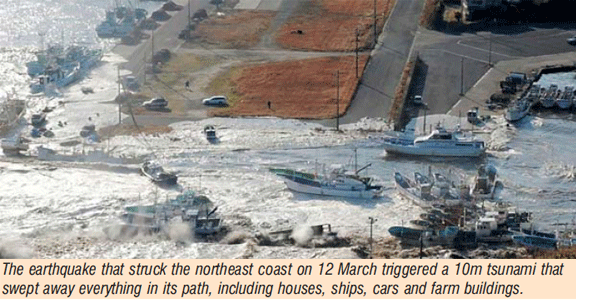The Japanese will rise again…
Industrial Economist – Apr 04, 2011
The upbringing of the Japanese even from the school level is based on their sound traditional cultural values which focused on group work, hardwork and the ability to put the nation over self. They are so drilled in this manner that they do not feel there is anything that can be more efficient than
THE JAPANESE EARTHQUAKE cum tsunami is one of the worst disasters to have hit the world in the past 100 years. An earthquake with a magnitude of 9.0 on the Richter scale resulted in a tsunami which triggered a maximum wind speed of 800 km/hr (the speed of a Boeing or an Airbus jet plane). The earthquake lasted an incredible four to five minutes, had a depth of about 24.4 km and moved the entire island of Honshu (which has a length of about 1300 km) by a whopping 2.4 km. Adding to all this is the fact that 400 aftershocks occurred after the earthquake; people 2000 km away could feel it and it has been 1200 years since Japan has had such a quake. The aftermath of this ruthless fury of nature is of gigantic proportions. As I write this, the number of people dead is estimated at over 14,000 and the injured and missing are several thousands more. Years of hard work, years of industrial and agricultural growth have been destroyed to pieces. Adding to all this is the deteriorating situation in Fukushima nuclear power plant where 4 reactors have exploded and the threat of radiation is high.
Sriram Balasubramanian
After all this, what do the Japanese do? They just try to lead a normal lifeand that is the biggest asset of the Japanese.
Used to calamities…
The Japanese are used to calamities. Even as the nuclear dust on Hiroshima and Nagasaki settled, Japan rose within the next few decades to be one of the leading global economies. They built the world’s best disaster prevention systems. This tragedy, was a different one although. The worst possible combination of disasters pushed the disaster management systems to the limit. The Japanese were very unfortunate in that the issue was not in the safety mechanisms; the issue was with the dual attack by nature that left them totally crippled. Take the case of the nuclear reactors. The issue here is not with regard to the mechanism. Once the earthquake struck, the reactor was shutting down as programmed; but the tsunami caused a power shortage which in turn affected the process of cooling of the nuclear material reacting in the nuclear reactor. As a result, cooling became an issue and the reactors exploded. On hindsight it may be argued that the nuclear power plant should not have been built on the fault lines. But look at the manner of coping with the catastrophe: scores of Japanese workers, including the 50 in the plant, were working their socks off, to prevent a bigger calamity. These are people who are risking their lives to save humanity at large.
Ability to stay calm…
The world has been fascinated with the ability of the Japanese people to stay calm amidst the storm. No riots. No looting of super markets. No cursing of nature. No self pity. On the contrary, they were trying to salvage the situation by helping each other by sharing food and homes and were standing in queues for their turn to get food at various relief camps. This is Japan for you. A strict adherence to structured mechanisms, an intense focus on manufacturing coupled with the strong culture which imbibed hard work in their upbringing. These qualities ensured that the Japanese were world beaters. The western world in equal measure admires and mocks at the Japanese for their rigid adherence to mechanism and their ability to put the nation above self. The Japanese will rise again.
This article can also be viewed at http://www.industrialeconomist.com/page.php?page=24&&cid=203

